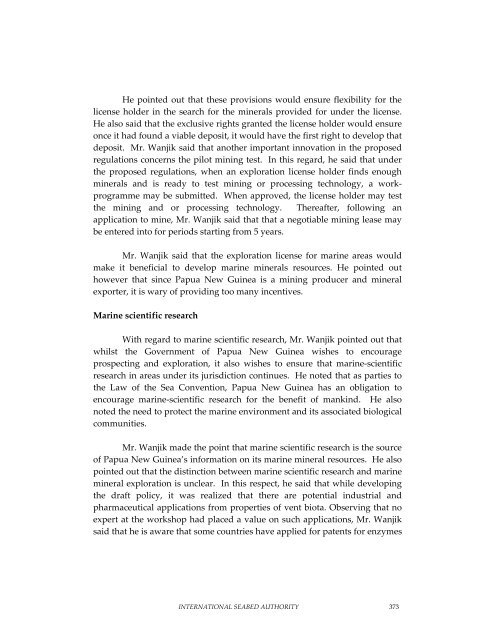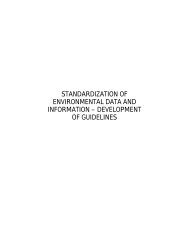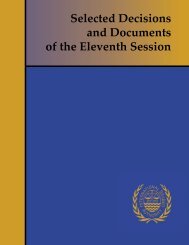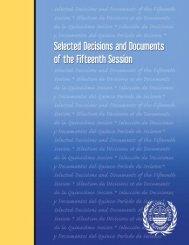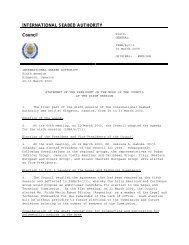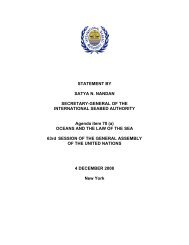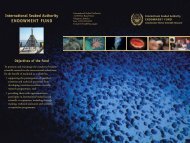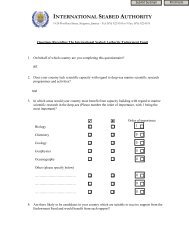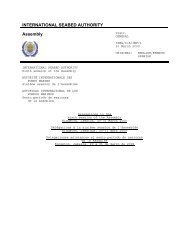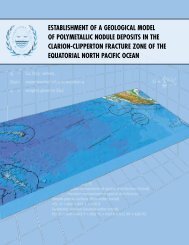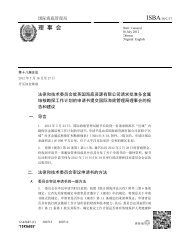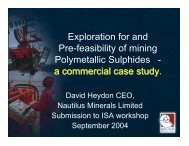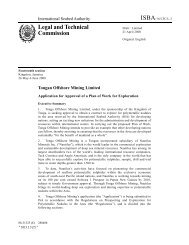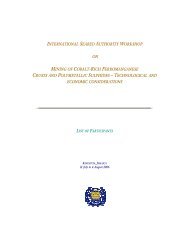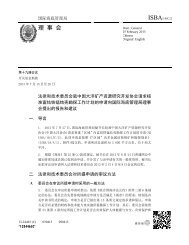- Page 2 and 3:
Workshop on Minerals Other than Pol
- Page 4 and 5:
Published in Jamaica 2004 by the In
- Page 6 and 7:
Chapter 6* Impact of the Developmen
- Page 8 and 9:
PART 4 REGULATORY AND PROMOTIONAL F
- Page 10 and 11:
The Authority designates one of two
- Page 12 and 13:
deposits and gas hydrates of the co
- Page 14 and 15:
Prof. Chris German, Challenger Divi
- Page 16 and 17:
Mr. Sven Petersen, Research Associa
- Page 18 and 19:
SECRETARIAT Ambassador Satya N. Nan
- Page 20 and 21:
is to submit “an application that
- Page 22 and 23:
that was established to help protec
- Page 24 and 25:
on the continental margin. He state
- Page 26 and 27:
with the German firm Preussag. As p
- Page 28 and 29:
metre or metres of these black smok
- Page 30 and 31:
nodules in terms of these metals -
- Page 32 and 33:
Professor Herzig stressed however t
- Page 34 and 35:
While noting that the continuity of
- Page 36 and 37:
asal diameter at 1,600 m water dept
- Page 38 and 39:
discovery of the new hydrothermal s
- Page 40 and 41:
esearch cruises dedicated to ferrom
- Page 42 and 43:
global mid-ocean ridge system. He p
- Page 44 and 45:
athymetric map of the seafloor. A s
- Page 46 and 47:
were encouraging. In the course of
- Page 48 and 49:
that this matter was sensitive, he
- Page 50 and 51:
complete a preliminary evaluation o
- Page 52 and 53:
metals - nickel, cobalt, manganese,
- Page 54 and 55:
12. Issues to be taken into account
- Page 56 and 57:
entities. Many of them included min
- Page 58 and 59:
In this regard, the Secretary-Gener
- Page 60 and 61:
According to Dr. Vysotsky, as estim
- Page 62 and 63:
With regard to current knowledge ab
- Page 64 and 65:
Dr. Corbett gave a brief account of
- Page 66 and 67:
River resulting in the introduction
- Page 68 and 69:
Ms. Zaamwani pointed out that as th
- Page 70 and 71:
geochemical and geotechnical survey
- Page 72 and 73:
of its continental shelf through bi
- Page 74 and 75:
also stated, is similar to that of
- Page 76 and 77:
Chapter 7 Technical requirements fo
- Page 78 and 79:
Table 1: Classification of marine m
- Page 80 and 81:
Volcanogenic Metalliferous sediment
- Page 82 and 83:
deposits, including massive sulphid
- Page 84 and 85:
3. Marine Minerals Related to Deep
- Page 86 and 87:
The black smoker chimneys dischargi
- Page 88 and 89:
contain metals are present at discr
- Page 90 and 91:
Figure 4. A diagrammatic east-west
- Page 92 and 93:
and refining of these crusts is mor
- Page 94 and 95:
distances of hundreds of kilometres
- Page 96 and 97:
2) Deep ocean hot springs at massiv
- Page 98 and 99:
6. P.A. Rona, M.D. Hannington, C.V.
- Page 100 and 101:
25. M.J. Cruickshank (1998), Law of
- Page 102 and 103:
With regard to marine mineral depos
- Page 104 and 105:
Focussing on sites of sea floor min
- Page 106 and 107:
scientific journal "Nature". The su
- Page 108 and 109:
Professor Rona recalled that the in
- Page 110 and 111:
like St. Stephen’s in the Kremlin
- Page 112 and 113:
He noted that another product of ho
- Page 114 and 115:
The reasons why the Red Sea deposit
- Page 116 and 117:
a number of geothermal wells have b
- Page 118 and 119:
1. Introduction The discovery of hi
- Page 120 and 121:
0° 30° 30° 60° Explorer Ridge C
- Page 122 and 123:
3. Hydrothermal Convection At ocean
- Page 124 and 125:
Due to its increased buoyancy at hi
- Page 126 and 127:
5. Metal Contents Despite moderate
- Page 128 and 129:
(11.8 wt.%), and have high concentr
- Page 130 and 131:
Table 3: Size and Tonnage - Atlanti
- Page 132 and 133:
Local enrichment of more than 40 pp
- Page 134 and 135:
the Red Sea, Middle Valley, Explore
- Page 136 and 137:
Table 8: Advantages of Seafloor Mas
- Page 138 and 139:
60 kg Au) located on the neighbouri
- Page 140 and 141:
9. Perspective If further explorati
- Page 142 and 143:
3. J.M. Franklin, J.W. Lydon, and D
- Page 144 and 145:
19. R.A. Zierenberg, Y. Fouquet, D.
- Page 146 and 147:
35. J. Collier, M. Sinha (1990), Se
- Page 148 and 149:
53. P.M. Herzig, Y. Fouquet, M.D. H
- Page 150 and 151:
68. M.D. Hannington, J.M. Peter, an
- Page 152 and 153:
85. The New York Times (1997), Firs
- Page 154 and 155:
southern segment is a fast-spreadin
- Page 156 and 157:
Professor Herzig said that the spec
- Page 158 and 159:
Professor Herzig said that the depo
- Page 160 and 161:
Professor Herzig informed participa
- Page 162 and 163:
he informed participants that in ad
- Page 164 and 165:
In relation to Conical Seamount, Pr
- Page 166 and 167:
deposits is essential to reliably a
- Page 168 and 169:
would be removed from the deposit.
- Page 170 and 171:
CHAPTER 3 REGIONAL AND LOCAL VARIAB
- Page 172 and 173:
� Metallogenic provinces that are
- Page 174 and 175:
A digital map of ore-bearing region
- Page 176 and 177:
of the slopes in between 1500-3000m
- Page 178 and 179:
development there are areas with ma
- Page 180 and 181:
Regarding the formation of the firs
- Page 182 and 183:
SUMMARY OF THE PRESENTATION AND DIS
- Page 184 and 185:
the Juan-de-Fuca Ridge, the Guaymas
- Page 186 and 187:
Intensive investigations resulted i
- Page 188 and 189:
Based on the potential resources co
- Page 190 and 191:
It should be noted that other massi
- Page 192 and 193:
Generally, the massive sulphides or
- Page 194 and 195:
With regard to the gold values repo
- Page 196 and 197:
CHAPTER 5 COBALT-RICH FERROMANGANES
- Page 198 and 199:
Current patterns, topography, botto
- Page 200 and 201:
Table 1: Contents of manganese, iro
- Page 202 and 203:
INTERNATIONAL SEABED AUTHORITY 194
- Page 204 and 205:
Depth (km) 0 100 200 0 1 2 3 4 5 O
- Page 206 and 207:
sediment. Those thinly veiled crust
- Page 208 and 209:
Table 3: Cruises dedicated to the s
- Page 210 and 211:
today. Field studies by the USA, Ge
- Page 212 and 213:
Phosphorite and fresh basalt are st
- Page 214 and 215:
3.2. Mineralogy The mineralogy of b
- Page 216 and 217:
Samples 25 20 15 10 5 0 Growth Rate
- Page 218 and 219:
3.4. Chemical Composition All USGS
- Page 220 and 221:
elements associated with the detrit
- Page 222 and 223:
Sample/PAAS 100 10 1 0.1 0.01 0.001
- Page 224 and 225:
INTERNATIONAL SEABED AUTHORITY 216
- Page 226 and 227:
INTERNATIONAL SEABED AUTHORITY 218
- Page 228 and 229:
Phosphatization of the older Fe-Mn
- Page 230 and 231:
A. B. C. Mn FSM-Palau Marshall Isla
- Page 232 and 233:
4. Iron-Manganese Crust Formation E
- Page 234 and 235:
5. Biological Communities and Curre
- Page 236 and 237:
6. Resource, Technology and Economi
- Page 238 and 239:
MAJOR DIMENSIONS Length : 13 m Widt
- Page 240 and 241:
not economical, under the circumsta
- Page 242 and 243:
Based on grade, tonnage, and oceano
- Page 244 and 245:
3. J.R. Hein and C.L. Morgan (1999)
- Page 246 and 247:
deep sea deposits, Report on the Sc
- Page 248 and 249:
29. T. Moritani and S. Nakao (eds.)
- Page 250 and 251:
Angeles, CA, International Society
- Page 252 and 253:
geochemistry of Central Pacific fer
- Page 254 and 255:
73. J.W. Moffett (1990), Microbiall
- Page 256 and 257:
86. D. Puteanus and P. Halbach (54)
- Page 258 and 259:
110. A Koschinsky and P Halbach (46
- Page 260 and 261:
132. J.R. Hein et al. (1) 133. H.H.
- Page 262 and 263:
B. 14°30'N 14°20'N 14°10'N 160°
- Page 264 and 265:
Appendix 4. 1-m-diameter circular c
- Page 266 and 267:
economic potential in hydrogenetic
- Page 268 and 269:
Zealand Oceanographic Institute, th
- Page 270 and 271:
depths. Up welling increases primar
- Page 272 and 273:
een recovered is 25 cm. He also sai
- Page 274 and 275:
shallower than 1500 metres, a shall
- Page 276 and 277:
In relation to mining technology, o
- Page 278 and 279:
On the most promising sites for cru
- Page 280 and 281:
In addition to the International Se
- Page 282 and 283:
1. Introduction Plant life is impos
- Page 284 and 285:
Table 1 Potential microbial metabol
- Page 286 and 287:
Figure 2 Simplified representation
- Page 288 and 289:
Figure 3 Major components of a gene
- Page 290 and 291:
the mussel's nutrition. When experi
- Page 292 and 293:
Reasons for this do not appear to b
- Page 294 and 295:
egions, one study pointed out that
- Page 296 and 297:
very widespread, supporting microbi
- Page 298 and 299:
Studies of the rapid colonisation o
- Page 300 and 301:
y mining, which is expected to be v
- Page 302 and 303:
2. J. B. Corliss, J. Dymond, L. Gor
- Page 304 and 305:
19. V. Tunnicliffe, A.G. McArthur a
- Page 306 and 307:
SUMMARY OF THE PRESENTATION AND DIS
- Page 308 and 309:
together with mucus that is secrete
- Page 310 and 311:
close to neutral ph conditions, it
- Page 312 and 313:
France, Germany, the United Kingdom
- Page 314 and 315:
of the sedimentary column, whereas
- Page 316 and 317:
Table 2: Research Submersibles and
- Page 318 and 319:
4. Technical Requirements For resea
- Page 320 and 321:
5. Processing Technologies The phys
- Page 322 and 323:
grow on substrate rocks because of
- Page 324 and 325:
5. M.D. Hannington, A.G. Galley, P.
- Page 326 and 327:
Dr. Herzig informed participants th
- Page 328 and 329:
search for sites of hydrothermal ve
- Page 330 and 331: with such a grab. In addition to th
- Page 332 and 333: Remotely operated vehicles (ROVs) D
- Page 334 and 335: equired to make sure that the ship
- Page 336 and 337: Dr. Herzig summarized the technical
- Page 338 and 339: commercial. Since confidentiality o
- Page 340 and 341: CHAPTER 8 FACTORS IN FINANCING EXPL
- Page 342 and 343: The traditional project stages that
- Page 344 and 345: there is a subset that forms in spe
- Page 346 and 347: of competing for the attention of i
- Page 348 and 349: 7. Why SMS Mines will be Lower Cost
- Page 350 and 351: 8. Modelling SMS mining offers scop
- Page 352 and 353: Because exhalative SMS deposits are
- Page 354 and 355: SUMMARY OF THE PRESENTATION AND DIS
- Page 356 and 357: flow to the metal markets. He also
- Page 358 and 359: shortage in the next couple of year
- Page 360 and 361: starts, the operation could take pl
- Page 362 and 363: Based on this and other considerati
- Page 364 and 365: Mr. Malnic said that the mining ope
- Page 366 and 367: and silver. Except for volcanically
- Page 368 and 369: 2.2. Major Features of the Draft Of
- Page 370 and 371: As a general principle the fiscal p
- Page 372 and 373: I think the issue is not as simple
- Page 374 and 375: Table 3: Data and information requi
- Page 376 and 377: former case a reminder notice is se
- Page 378 and 379: 6. Elisabeth Mann Borgese, Ocean Go
- Page 382 and 383: from the deep sea. One group of enz
- Page 384 and 385: CHAPTER 10 NATIONAL AND INTERNATION
- Page 386 and 387: times greater than atmospheric pres
- Page 388 and 389: Fig. 2 Schematic diagram showing th
- Page 390 and 391: Figure. 4: Distributions of hydroth
- Page 392 and 393: Figure 6: Distributions of hydrothe
- Page 394 and 395: Figure.8: Plot of incidence of hydr
- Page 396 and 397: et al., 1998) - one of the two very
- Page 398 and 399: seabed but, instead, are dispersed
- Page 400 and 401: Figure 10: The Southampton Oceanogr
- Page 402 and 403: oxide material, polymetallic sulphi
- Page 404 and 405: Figure 13: TOBI sidescan sonar imag
- Page 406 and 407: ACKNOWLEDGEMENTS I would like to ex
- Page 408 and 409: 15. Cronan D S (ed.) Handbook of Ma
- Page 410 and 411: 33. Gross G.A. and McLeod C.R., Met
- Page 412 and 413: 51. Jones H. A. and Davies P. J., P
- Page 414 and 415: 69. Manheim F. T., Composition and
- Page 416 and 417: 87. Muller, R.D., Roest, W.R., Roye
- Page 418 and 419: 107. Warren, J., Evaporites: their
- Page 420 and 421: cultivating sulphide oxidising bact
- Page 422 and 423: In relation to spreading rates at v
- Page 424 and 425: coordination to actually get to go
- Page 426 and 427: esources and to know whether or not
- Page 428 and 429: ROVS, AUVs or submersibles to produ
- Page 430 and 431:
have oversimplified the case in his
- Page 432 and 433:
CHAPTER 11 A COMPARISON OF THE POSS
- Page 434 and 435:
This paper proposes to compare the
- Page 436 and 437:
• The distance between the mining
- Page 438 and 439:
economic value. Phosphatisation has
- Page 440 and 441:
The morphology of the mineral edifi
- Page 442 and 443:
Table 3: Geochemistry of known mass
- Page 444 and 445:
Detailed exploration has not been c
- Page 446 and 447:
flotation, can separate the ferroma
- Page 448 and 449:
The crushed and ground ore can be c
- Page 450 and 451:
3.2. Assumptions made for each kind
- Page 452 and 453:
alloys or even manganese ore in the
- Page 454 and 455:
ought the nickel price to a top. Th
- Page 456 and 457:
Because the metal market economy is
- Page 458 and 459:
14. J. -P. Lenoble (1992), Future d
- Page 460 and 461:
31. J. Francheteau, D. Needham, P.
- Page 462 and 463:
48. J. -P. Lenoble (1996), Les nodu
- Page 464 and 465:
66. J. -J. Prédali and J. -P. Polg
- Page 466 and 467:
classification system, Mr. Lenoble
- Page 468 and 469:
To recapitulate the sizes and possi
- Page 470 and 471:
proposed processing technologies an
- Page 472 and 473:
international community is only jus
- Page 474 and 475:
Part 2 ISSUES TO BE TAKEN INTO ACCO
- Page 476 and 477:
The Secretary-General said that the
- Page 478 and 479:
Mr. Nandan pointed out that the nex
- Page 480 and 481:
problems would resurface, because i
- Page 482 and 483:
prospecting would be more applicabl
- Page 484 and 485:
dimensional seafloor massive sulphi
- Page 486 and 487:
workshop, in relation to deposit ev
- Page 488 and 489:
an economic perspective, including
- Page 490 and 491:
sulphides and cobalt-rich ferromang
- Page 492 and 493:
CHAPTER 13 PETROLEUM POTENTIAL AND
- Page 494 and 495:
structure and filled with sediments
- Page 496 and 497:
Basin groups are subdivided into ty
- Page 498 and 499:
during the late Mesozoic-Cenozoic s
- Page 500 and 501:
Figure 4: Volume density of initial
- Page 502 and 503:
ITIPRHC = Vnr φHC γ 103 (Mmtoe),
- Page 504 and 505:
Table 1: Offshore (deepwater) initi
- Page 506 and 507:
Speaking about particular geographi
- Page 508 and 509:
World Ocean, including areas off no
- Page 510 and 511:
Table 4: Largest oil and gas discov
- Page 512 and 513:
The extremely harsh environment bro
- Page 514 and 515:
In other regions of the world, enco
- Page 516 and 517:
REFERENCES 1. L.G. Weeks (1971), Ma
- Page 518 and 519:
SUMMARY OF PRESENTATION AND DISCUSS
- Page 520 and 521:
Dr. Vysotsky said that estimates of
- Page 522 and 523:
In Southeast Asia, Dr. Vysotsky spo
- Page 524 and 525:
Philippines, and possibly Brazil. W
- Page 526 and 527:
and we shall encounter severe deple
- Page 528 and 529:
In the 1960's scientists discovered
- Page 530 and 531:
Figure 2. Worldwide locations of kn
- Page 532 and 533:
methane by bacteria in an anoxic en
- Page 534 and 535:
It has been assumed that the struct
- Page 536 and 537:
identification of gas hydrate in ma
- Page 538 and 539:
ottom simulating reflections (BSR)
- Page 540 and 541:
Figure 6: Interpretative plot of hy
- Page 542 and 543:
floor have indicated the presence o
- Page 544 and 545:
of free gas below the BSR is usuall
- Page 546 and 547:
sediment and to provide an indicati
- Page 548 and 549:
6. Harvesting methane hydrates -Som
- Page 550 and 551:
deposits can be commercial, even in
- Page 552 and 553:
at a catastrophic scale. Some of th
- Page 554 and 555:
Figure 8. Development of hydrate re
- Page 556 and 557:
This is perhaps due to the percepti
- Page 558 and 559:
would provide Japan with methane fo
- Page 560 and 561:
NOTES AND REFERENCES 1. E.D. Sloan
- Page 562 and 563:
20. R.F. Meyer (1981), Speculation
- Page 564 and 565:
Master Workshop on Gas Hydrates: Re
- Page 566 and 567:
60. M.D. Max and M.J. Cruickshank (
- Page 568 and 569:
is that their exploitation might re
- Page 570 and 571:
further pointed out that even if on
- Page 572 and 573:
Dr. Desa also informed participants
- Page 574 and 575:
thickness of the sediments, the thi
- Page 576 and 577:
pressure at sea level leads to hydr
- Page 578 and 579:
aware of any studies of natural ear
- Page 580 and 581:
CHAPTER 15 A CASE STUDY IN THE DEVE
- Page 582 and 583:
NAMIBIA L W OR CT BOTSWANA SOUTH AF
- Page 584 and 585:
The Orange River, one of Africa’s
- Page 586 and 587:
formation of a large accretion coar
- Page 588 and 589:
The deep-water ore body more closel
- Page 590 and 591:
4. The mineral resource management
- Page 592 and 593:
deployed on a MacArtney FOCUS 400 R
- Page 594 and 595:
Utilising Jago has made very detail
- Page 596 and 597:
Although at first glance the nature
- Page 598 and 599:
to levels capable of sustaining sea
- Page 600 and 601:
In accordance with De Beers’ over
- Page 602 and 603:
ACKNOWLEDGEMENTS I thank my many co
- Page 604 and 605:
16. I.B. Corbett (1989), The sedime
- Page 606 and 607:
SUMMARY OF PRESENTATION AND DISCUSS
- Page 608 and 609:
eroded during regression and transg
- Page 610 and 611:
diamond mining business. Dr. Corbet
- Page 612 and 613:
technological step, Dr. Corbett sug
- Page 614 and 615:
and Ore Reserves (JORC). He also sa
- Page 616 and 617:
With another slide, Dr. Corbett sho
- Page 618 and 619:
of De Beers’ deepwater operation
- Page 620 and 621:
system that allows other functions
- Page 622 and 623:
CHAPTER 16 A CASE STUDY IN THE DEVE
- Page 624 and 625:
change through heat transport and c
- Page 626 and 627:
Main sites of oxygen minimum Flow o
- Page 628 and 629:
• Undertake necessary mitigatory
- Page 630 and 631:
State, by such spilling or pollutio
- Page 632 and 633:
including diamonds, from non-fluore
- Page 634 and 635:
agreements require that government
- Page 636 and 637:
including current velocities, oxyge
- Page 638 and 639:
ackground levels and confined to a
- Page 640 and 641:
Sonar equipment used on some DBM ve
- Page 642 and 643:
advocated this approach for environ
- Page 644 and 645:
local geology, sedimentology and mi
- Page 646 and 647:
Levene’s test could also be used
- Page 648 and 649:
unquestionably be alarming, and the
- Page 650 and 651:
3.4 Future Innovation in Video Tran
- Page 652 and 653:
sponges and bryozoans to more gener
- Page 654 and 655:
esearch contributions of Mark Gibbo
- Page 656 and 657:
16. Craig R. Smith (1998), The Biol
- Page 658 and 659:
magellanicus, Gmein) populations. J
- Page 660 and 661:
SUMMARY OF PRESENTATION AND DISCUSS
- Page 662 and 663:
presentation he would show that kno
- Page 664 and 665:
process of self-regulatory checking
- Page 666 and 667:
initial mining, but that within a v
- Page 668 and 669:
continental shelf. He suggested tha
- Page 670 and 671:
would result in the extermination o
- Page 672 and 673:
The participant from Saudi Arabia r
- Page 674 and 675:
of the Namibian government would be
- Page 676 and 677:
With the exception of the West Paci
- Page 678 and 679:
1.3 Resources The oceanic regions o
- Page 680 and 681:
2 Physiography of the Ocean Floor a
- Page 682 and 683:
INTERNATIONAL SEABED AUTHORITY 674
- Page 684 and 685:
partially separated continental fra
- Page 686 and 687:
occur beneath the continental shelf
- Page 688 and 689:
Using these criteria, a number of a
- Page 690 and 691:
3.3 Methods used to assess resource
- Page 692 and 693:
4.1.2 How marine placer deposits ar
- Page 694 and 695:
to survive the transgression are pr
- Page 696 and 697:
4.2.2 Where marine phosphorite depo
- Page 698 and 699:
sedimentary layers that are favoura
- Page 700 and 701:
4.4 Marine Polymetalic sulphides 4.
- Page 702 and 703:
4.4.4 Resource potential of marine
- Page 704 and 705:
The most up to date information of
- Page 706 and 707:
Manganese crusts that are rich in c
- Page 708 and 709:
(3) where bottom currents are effec
- Page 710 and 711:
There are four elements are of econ
- Page 712 and 713:
averaging 2kg/m 2 . These contain e
- Page 714 and 715:
520 million tonnes of copper”. In
- Page 716 and 717:
INTERNATIONAL SEABED AUTHORITY 708
- Page 718 and 719:
INTERNATIONAL SEABED AUTHORITY 710
- Page 720 and 721:
Elemental resources for the top ten
- Page 722 and 723:
natural gas is commonly formed in a
- Page 724 and 725:
These areas are almost exclusively
- Page 726 and 727:
Table 5 (with reference to Figure 2
- Page 728 and 729:
with the term “resource” used e
- Page 730 and 731:
Similarly, much of the continental
- Page 732 and 733:
Although this is not an assessment
- Page 734 and 735:
A qualitative indication of resourc
- Page 736 and 737:
4.7.2 How marine gas hydrate deposi
- Page 738 and 739:
However, this does not include the
- Page 740 and 741:
Figure 28 shows the location of are
- Page 742 and 743:
ELCS region Location Hydrate potent
- Page 744 and 745:
INTERNATIONAL SEABED AUTHORITY 736
- Page 746 and 747:
Franklin Seamount, western Woodlark
- Page 748 and 749:
Emery K. O. and Noakes L. C., Econo
- Page 750 and 751:
Herzig, P.M. and Hannington M. D.,
- Page 752 and 753:
Kvenvolden, K.A., Gas hydrates as a
- Page 754 and 755:
Meyer, R.F., Speculations on oil an
- Page 756 and 757:
Scott, S.D., Seafloor polymetallic
- Page 758 and 759:
Evaporite deposits http://www.black
- Page 760 and 761:
SUMMARY OF PRESENTATION AND DISCUSS
- Page 762 and 763:
these areas cover something like 25
- Page 764 and 765:
continental margins. He mentioned p
- Page 766 and 767:
programme off Nankeen, Japan, and t
- Page 768 and 769:
een happily persuaded in the other
- Page 770 and 771:
Part 4 REGULATORY AND PROMOTIONAL F
- Page 772 and 773:
own Namdeb. In addition, there are
- Page 774 and 775:
The stated purpose of the Minerals
- Page 776 and 777:
programme and specified minimum exp
- Page 778 and 779:
them to give proper attention to ea
- Page 780 and 781:
evaluation purposes in monitoring t
- Page 782 and 783:
as far as the development of minera
- Page 784 and 785:
Ms. Zaamwani said that the main leg
- Page 786 and 787:
Ms. Zaamwani told participants that
- Page 788 and 789:
the Ministry could benefit, as is c
- Page 790 and 791:
understaffing do not currently util
- Page 792 and 793:
One participant recalled that Ms. Z
- Page 794 and 795:
vessels there are sophisticated sec
- Page 796 and 797:
Ms. Zaamwani was asked about regula
- Page 798 and 799:
70° 60° NORTH SEA -30° -20° -10
- Page 800 and 801:
of 9.6 billion Sm 3 oil equivalents
- Page 802 and 803:
Nor does it give rights or priority
- Page 804 and 805:
1 4. Data Management All data relat
- Page 806 and 807:
possibility to evaluate the results
- Page 808 and 809:
planning of future activities. The
- Page 810 and 811:
SUMMARY OF THE PRESENTATION ON THE
- Page 812 and 813:
in the Barents Sea there is still a
- Page 814 and 815:
period that can last up to ten year
- Page 816 and 817:
conditions in these areas, as well
- Page 818 and 819:
designated by the Ministry. She sai
- Page 820 and 821:
quantity of data involved in the in
- Page 822 and 823:
operation (PDO) is normally prepare
- Page 824 and 825:
to the data when an area is relinqu
- Page 826 and 827:
CHAPTER 20 STATUS REPORT ON THE DAT
- Page 828 and 829:
All the above-mentioned minerals oc
- Page 830 and 831:
e water depths between 400 and 1,00
- Page 832 and 833:
As far as the Government is concern
- Page 834 and 835:
• Ordinance number 195, of Decemb
- Page 836 and 837:
This tax must be paid up to January
- Page 838 and 839:
the one whose burning is authorised
- Page 840 and 841:
ANP may send a representative to fo
- Page 842 and 843:
esources other than oil or natural
- Page 844 and 845:
to the safety of persons and animal
- Page 846 and 847:
found offshore Brazil. With regard
- Page 848 and 849:
een discovered in the basin, includ
- Page 850 and 851:
enhance oil recovery. He said that
- Page 852 and 853:
g. Ordinance number 10 that regulat
- Page 854 and 855:
He said that the environment has to
- Page 856 and 857:
ids. These comprised five Brazilian
- Page 858 and 859:
After oil exploration gained moment
- Page 860 and 861:
Those who are entitled to the land
- Page 862 and 863:
and replaced by the President, and
- Page 864 and 865:
(ii) Assure the safety of navigatio
- Page 866 and 867:
explorations may continue concurren
- Page 868 and 869:
Appoint an authorized representativ
- Page 870 and 871:
The contractor will recover all ope
- Page 872 and 873:
of US dollar... (negotiable) within
- Page 874 and 875:
Processing of products is subject t
- Page 876 and 877:
are more than 30 articles in the va
- Page 878 and 879:
SUMMARY OF THE PRESENTATION AND DIS
- Page 880 and 881:
Ambassador Djalal informed particip
- Page 882 and 883:
production-sharing contracts became
- Page 884 and 885:
said that the remainder of the prod
- Page 886 and 887:
and cooperation with Pertamina and
- Page 888 and 889:
A participant wanted to know whethe
- Page 890 and 891:
of CCOP/SOPAC was to promote and de
- Page 892 and 893:
STAR was founded in 1985 in collabo
- Page 894 and 895:
Since 1972, SOPAC has, on behalf of
- Page 896 and 897:
France Seapso 1985-1986 Cook Is, Fi
- Page 898 and 899:
polymetallic massive sulphides. The
- Page 900 and 901:
crusts have also been found in area
- Page 902 and 903:
Figure 2: Location Map of Known Pol
- Page 904 and 905:
is currently no regional agency tas
- Page 906 and 907:
The types of data that have been in
- Page 908 and 909:
A new agreement between Japan and S
- Page 910 and 911:
SOPAC’s continuing and relentless
- Page 912 and 913:
deposits will be mined at some poin
- Page 914 and 915:
REFERENCES 1. D. Tiffin and C Matos
- Page 916 and 917:
18. J. Malnic. (1999). Marine Miner
- Page 918 and 919:
8. Individual nations should develo
- Page 920 and 921:
SUMMARY OF THE PRESENTATION ON THE
- Page 922 and 923:
With regard to the name of the orga
- Page 924 and 925:
the benefit that had accrued to the
- Page 926 and 927:
The discussions that followed Mr. S
- Page 928:
About the International Seabed Auth


